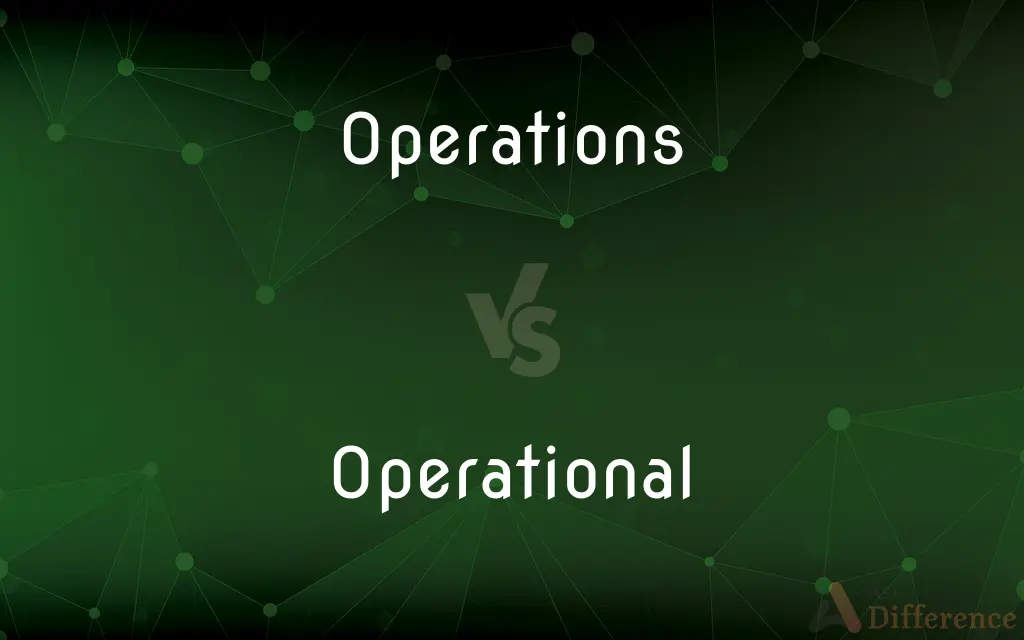Operations vs. Operational — What's the Difference?
By Fiza Rafique & Maham Liaqat — Updated on March 18, 2024
Operations refer to the ongoing activities in a business or system essential for functionality, while operational describes the state of being functional, effective, and ready for use.

Difference Between Operations and Operational
Table of Contents
ADVERTISEMENT
Key Differences
Operations encompass the regular, day-to-day activities and tasks that are fundamental to the running of a business or system. These activities are designed to generate value, be it through producing goods, providing services, or ensuring the smooth running of organizational processes. On the other hand, operational pertains to the condition of being in a state where these activities can be carried out effectively, indicating that a system or process is functional, ready for use, and capable of performing its intended tasks.
The term "operations" involves the practical execution of tasks and the management of resources, including human, financial, and material assets, to achieve specific objectives. It is concerned with the efficiency and effectiveness of processes, and how these processes interlink to form the operational backbone of an entity. Conversely, "operational" is an adjective that describes the readiness and capability of these processes or systems to function as intended, often used to denote the transition from a non-functional to a functional state.
In a business context, operations might include manufacturing, logistics, customer service, and other core activities that directly contribute to the production and delivery of goods and services. Being operational, in this sense, means that these facets of the business are up and running, capable of fulfilling their roles within the organization's larger operational framework.
The effectiveness of operations is critical to an organization's success, as it directly impacts productivity, customer satisfaction, and profitability. The operational status of a system or process, therefore, is a key indicator of its ability to contribute to these goals, signifying that it is not only functional but also optimized for performance according to the set standards and expectations.
While the operations of a company are concerned with the 'what' and 'how' of task execution, the operational status is more about the 'state' of these tasks and systems. It's possible for a company to have well-defined operations but still struggle to be fully operational due to various challenges, such as technical issues, resource constraints, or inefficiencies.
ADVERTISEMENT
Comparison Chart
Definition
The ongoing activities and tasks essential for functionality.
The state of being functional, effective, and ready for use.
Focus
Execution of tasks, management of resources.
Readiness and capability to function.
Context
Concerned with the day-to-day running of a business or system.
Describes the condition of being ready and effective.
Impact
Directly contributes to the production and delivery of goods and services.
Indicates the system or process can perform its intended tasks.
Measurement
Efficiency and effectiveness of processes.
Functional status and performance optimization.
Compare with Definitions
Operations
Day-to-day activities.
The operations of the factory ensure continuous production.
Operational
Capability to function effectively.
Ensuring the machinery is operational is a top priority for the maintenance team.
Operations
Essential for functionality.
Smooth operations are crucial for the company's success in the market.
Operational
State of readiness.
The new software system is now fully operational.
Operations
Involves managing resources.
Effective operations require careful management of both human and material resources.
Operational
Indicates functionality.
The emergency services must remain operational at all times.
Operations
Impact productivity and profitability.
Streamlining operations can significantly improve the company's bottom line.
Operational
Prepared for use.
After extensive testing, the facility has been declared operational.
Operations
Core business activities.
Operations in a retail company include inventory management and customer service.
Operational
Optimized for performance.
The team worked tirelessly to get the network operational ahead of schedule.
Operations
The act or process of operating or functioning.
Operational
Of or relating to an operation or a series of operations.
Operations
The state of being operative or functional
A factory in operation.
Operational
Of, intended for, or involved in military operations.
Operations
A process or series of acts involved in a particular form of work
The operation of building a house.
Operational
Fit for proper functioning; ready for use
An operational aircraft.
Operations
An instance or method of efficient, productive activity
That restaurant is quite an operation.
Operational
Being in effect or operation
"de facto apartheid still operational even in the 'new' African nations" (Leslie Marmon Silko).
Operations
An unethical or illegal business
A fencing operation for stolen goods.
Operational
Of or relating to operations, especially military operations.
Operations
(Medicine) A surgical procedure for remedying an injury, ailment, defect, or dysfunction.
Operational
Functioning and ready for use.
Operations
(Mathematics) A process or action, such as addition, substitution, transposition, or differentiation, performed in a specified sequence and in accordance with specific rules.
Operational
Effective or operative.
Operations
A logical operation.
Operational
Determined by means of practical measures.
Operations
(Computers) An action resulting from a single instruction.
Operational
Of or pertaining to operations; as, operational procedure.
Operations
A military or naval action, campaign, or mission.
Operational
Fit or ready for service; available and in working condition; as, an operational aircraft. Opposite of out-of-service.
Operations
Operations The headquarters or center from which a military action, flights into and out of an airfield, or other activities are controlled.
Operational
Of or intended for or involved in military operations. Opposite of nonoperational.
Operations
Operations The division of an organization that carries out the major planning and operating functions.
Operational
In force; not expired or annulled; - of rules or laws.
De facto apartheid still operational even in the `new' African nations
Operations
Plural of operation
Operational
Pertaining to a process or series of actions for achieving a result;
Operational difficulties
They assumed their operational positions
Operations
Financial transactions at a brokerage; having to do with the execution of trades and keeping customer records.
Operational
Fit or ready for use or service;
The toaster was still functional even after being dropped
The lawnmower is a bit rusty but still usable
An operational aircraft
The dishwasher is now in working order
Operations
Financial transactions at a brokerage; having to do with the execution of trades and keeping customer records
Operational
Of or intended for or involved in military operations
Operational
Being in effect or operation;
De facto apartheid is still operational even in the `new' African nations
Bus service is in operation during the emergency
The company had several operating divisions
Common Curiosities
What does it mean for a system to be operational?
For a system to be operational means that it is in a state of readiness, fully functional, and capable of performing its intended tasks effectively.
What role does technology play in operations and being operational?
Technology plays a crucial role in streamlining operations, improving efficiency, and ensuring systems and processes are up-to-date and operational, enhancing overall performance.
Can a business have operations without being operational?
Yes, a business can have defined operations but may face challenges that prevent it from being fully operational, such as technical issues or resource constraints.
How can a business improve its operational status?
A business can improve its operational status by optimizing processes, ensuring the reliability of equipment and systems, and effectively managing resources to enhance functionality and performance.
Can external factors affect a company's operations and operational status?
External factors such as market trends, regulatory changes, and environmental conditions can significantly impact a company's operations and its ability to remain operational.
What are operations in a business context?
Operations in a business context refer to the essential day-to-day activities and tasks that are fundamental to the production and delivery of goods and services.
What is the difference between operations management and being operational?
Operations management involves planning, organizing, and supervising the day-to-day activities of a business, while being operational refers to the state of these activities and systems being ready and capable of functioning as intended.
How do operations impact a company's success?
Operations impact a company's success by directly influencing productivity, customer satisfaction, and profitability through the efficient execution of core business activities.
Is the term 'operational' only applicable to physical systems?
No, the term 'operational' can apply to both physical and non-physical systems, including software, policies, and procedures, indicating their readiness and functionality.
What is the significance of being operational in emergency services?
Being operational in emergency services is critical as it ensures that life-saving services and systems are always ready and capable of responding to emergencies effectively.
Share Your Discovery

Previous Comparison
Estate vs. Saloon
Next Comparison
Pentane vs. ButaneAuthor Spotlight
Written by
Fiza RafiqueFiza Rafique is a skilled content writer at AskDifference.com, where she meticulously refines and enhances written pieces. Drawing from her vast editorial expertise, Fiza ensures clarity, accuracy, and precision in every article. Passionate about language, she continually seeks to elevate the quality of content for readers worldwide.
Co-written by
Maham Liaqat















































